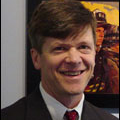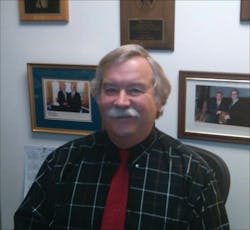A Special Friend of the Fire Service: Brian Cowan to Retire
When advocating for the Assistance to Firefighters Grant Program (AFG) -- whether in letters to Congressional leaders, meeting with staff or testimony before committees -- the fire service organizations have often cited various reports that gave high marks to the program. Since it was established in 2001, the FIRE Act has been a model federal grant program, efficiently and effectively delivering grant dollars to local first responders. The success of the program can be attributed to the collective efforts of the DHS grants office and the fire service; but one individual in particular deserves special recognition.
For my article this month, I would like to pay tribute to Brian Cowan, an outstanding public servant who will be retiring at the end of the month following nearly 30 years of dedicated service to the Federal Emergency Management Agency and Department of Homeland Security.
In 2001, Cowan was assigned to implement the Assistance to Firefighters Grant program -- no small task given the labyrinth of rules, regulations and parameters associated with administering any federal program. To his credit, Brian recognized the need to engage the fire service in the development and implementation of the program. He went beyond the minimum level of engagement and maintained constant contact with the major organizations to keep us apprised of any concerns or issues. He sought our input and welcomed our questions or ideas. Long before the term "transparency" became vogue in this town, Brian would always share with us matters that he felt deserved our attention.
The FIRE Act has had a tremendous impact on the safety of our nation's fire service -- from the small rural departments to the largest metro departments. Does the program run like clockwork? No, but name a program that does. To Brian's credit, he never allowed the program to run on cruise control. He was always sought ways to improve the delivery of the program, assimilating ideas and recommendations he and his staff received from the fire service and the edicts handed-down by Congress in the form of legislative changes.
For Brian, the Assistance to Firefighters Grant Program is a legacy in which he can take great pride. Sure, we can all give him plaques expressing our thanks and appreciation, but for him the greatest recognition should come in the form of the thousands of fire departments throughout the country that have been able to improve the safety of their firefighters through the grant program.
Brian never served one day in the fire service, but he can walk into any fire station in the country and talk the talk with a firefighter. He understands the challenges volunteers face with recruitment and retention as well as anyone and the challenges facing career departments to comply with minimum staffing standards. He understands how apparatus is designed and built and how departments and manufacturers derive at financing plans. He recognizes the importance of public safety education and the need for advancements in technology research. His knowledge of the challenges facing the fire service is a testament to his commitment to the program and desire to serve our nation's first responders.
On behalf of the Congressional Fire Services Institute, I would like to extend my personal thanks to Brian Cowan for his outstanding contributions to the safety of our nation's firefighters and rescue personnel. If you happen to read this article, Brian, please leave behind your forwarding number as I will still have plenty of reasons to contact you, even in your retirement.
BILL WEBB, a Firehouse.com Contributing Editor, is the Executive Director of the Congressional Fire Services Institute (CFSI). Established in 1989, CFSI is a nonprofit, nonpartisan policy institute designed to enhance Congressional awareness about the concerns and needs of the fire and emergency services. In his capacity, Bill works closely with members of Congress and fire service leaders on developing federal legislation to improve the readiness of our nation's fire and emergency services. Previously, he served in the first Bush Administration as Director of Advance at the U.S. Departments of Education and Labor, traveling across the country and abroad organizing events for the Secretaries.
About the Author

Bill Webb
Executive Director, CFSI
Bill Webb has served as executive director of the Congressional Fire Services Institute (CFSI) since 1995. CFSI is a nonprofit, nonpartisan policy institute designed to enhance congressional awareness about the concerns and needs of the fire and emergency services. As executive director, Webb works closely with members of Congress and fire service leaders to sustain support on Capitol Hill for programs and legislation that benefit our nation's fire and emergency services. Before joining CFSI, Webb worked for the Firefighter Combat Challenge as the project manager for the competition. He currently serves as vice chairman of the National Fallen Firefighters Foundation and is an honorary member of the Vienna Volunteer, the Delaware Volunteer Firefighters' Association and the International Association of Fire Fighters Local 36.
